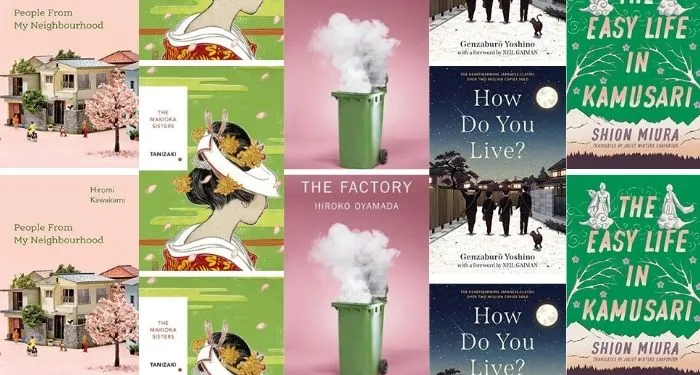
14 Must-Read Japanese Books Available in English Translation
Month by month, I’ve been reading amazing novels from all around the world that are available in English translation, in order to share those recommendations with all of you. I’ve read books from Catalonia, Mexico, France, Argentina, and Central Africa. And all through November, I read books from Japan — from strange, unsettling dystopias to charming novels about forestry to fabulist folklore retellings.
There is a blessed pack of books available in English from Japanese translation. The struggle was really about digging through the lists and the classics, to decide the best selection to share with all of you. Japanese is one of the languages that has been most blessed by translators — still not nearly enough, but a blessing nonetheless.
It’s a dream, and it means I’ve been careful to leave off the more obvious or mainstream books from this list. Don’t get me wrong, you should read the much-lauded novels by Banana Yoshimoto and Haruki Murakami. But I wanted to really prioritize highlighting contemporaries or classics that casual readers might not know off the top of their heads.
You might still recognize the books on my list, but I made sure that there are a good number of new or lesser known books here, so that those who have already dug into Japanese literature will still find a few surprises. So here are 14 must-read books available in English translation: some new, some old.
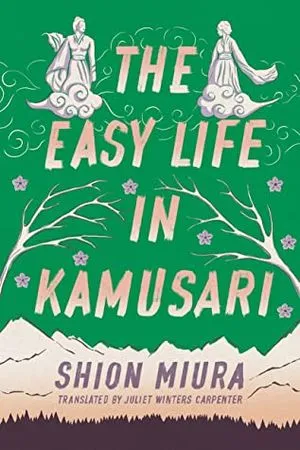
The Easy Life in Kamusari by Shion Miura, Translated by Juliet Winters Carpenter
A young man just out of high school is pushed into a forestry job in a remote village in the mountains by his parents, who are determined to get him out of the house. At first, he’s overwhelmed by the work and deathly bored by the village. But as he slowly gets to know the town, from one protective dog to his impulsive, wild host Yoki to the town’s ancient legends and inexplicable traditions, the place begins to grow on him — and he begins to want to prove himself to it in return. This sweet coming-of-age story just hit bookshelves on November 2. At turns touching and absurdly funny, the inventive novel is a love letter to the art of forestry and the majesty of trees, and is a perfect, easy read: sweet, cheery, and humorous, yet full of adventure.
Content warnings for mention of suicide.
Lonely Castle in the Mirror by Mizuki Tsujimura, Translated by Phillip Gabriel
In this novel, a bullied student is paralyzed with her fear of going to school each day. So when she is pulled into a new world, a castle where she and six other chosen students can take refuge during the day, she is delighted. The seven start searching for the Wishing Key — once they find it, the castle will disappear and their memories will too. There is only one rule: they must leave by 5 p.m. Or they will be eaten by the Wolf Queen. Enticing, mysterious, and full of heart, this 2021 release is a new must-read.
Content warnings include bullying, mental health, sexual assault, and mention of death by suicide.

The Factory by Hiroko Oyamada, Translated by David Boyd
This eerie satire is terrifyingly relatable. Three people are employed by the sprawling factory, an operation so big it’s a city, an ecosystem in its own right. One is a contract worker who just shreds documents. One is an academic who is very unclear what his job actually is. And another proofreads a random assortment of documents. For all of them, time becomes amorphous, the mindless labor feels somehow peaceful but also deadening. It is a rich, 116-page story that combines a touch of surrealism with an ironic critique of overly specialized labor and the impact it has on the human mind and outlook.
Content warning for sexual harassment.
The Sailor Who Fell from Grace with the Sea by Yukio Mishima, Translated by John Nathan
Noboru and his gang of 13-year-old friends are done with the world. Wanting to strike out against a world they see as overly soft, romantic, and sentimental, they decide to be practitioners of a new philosophy, “objectivity,” which essentially involves being carelessly emotionless. When Noburu’s single, wealthy mother starts dating a sailor named Ryuji, they have mixed feelings: at first they’re excited about a man who came from the sea, but once they decide that he’s part of that adult world they’re turned against, he quickly becomes a villain who deserves to be taken down.
Content warnings for animal cruelty and animal death, planning/discussion of violence.
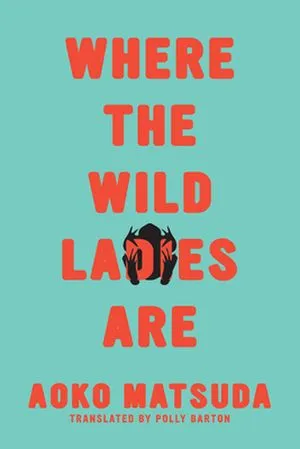
Where the Wild Ladies Are by Aoko Matsuda, Translated by Polly Barton
Matsuda has crafted a collection of fabulist, interconnected tales based on Japanese folklore and myth, a series of stories in which “monstrous” women, angry women, passionate and hairy women, told to rein in their energies, foster them instead. These spirits all cultivate their power with the guidance of mysterious Mr. Tei, forming a bureaucratic company that is trying to quietly change the world for the better. It’s a hilarious, dark, and tremendously fun book that I enjoyed from start to finish. This won the World Fantasy Award 2021 for best collection. As a fun bonus note, Matsuda herself has translated works by Karen Russell and Carmen Maria Machado into Japanese.
Content warnings for suicide, murder, rape, domestic abuse, sexual harassment.
Tokyo Ueno Station by Miri Yu, Translated by Morgan Giles
Korean-Japanese writer Miri Yū tells the story of Kazu, a man whose ghost haunts a park near Ueno Station. Yū chronicles his life, from his work at the 1964 Olympics to his time living in the park’s homeless population; she covers the trauma that the 2011 tsunami left in its wake and the rage that followed the announcement of the 2020 Olympics. First published in 2014, this instant modern classic is a powerful story about homelessness, about the severely isolating world of living at the margins, beneath the care of our systems, disposable. The book is ambiguous and hazy in all the best ways.
Content warnings for suicidal ideation and attempt, animal death, violence, addiction.
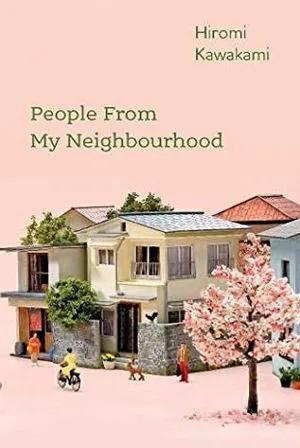
People from my Neighborhood by Hiromi Kawakami, Translated by Ted Goosen
In this glorious collection of micro fiction, the unnamed narrator shares 26 stories of their town, its eclectic characters and its fabulist happenings. Memories are quietly rearranged; two students aim to lead a revolution in hopes of having statues built in their honor; a lottery is held to decide who will take care of the always-hungry Hiromi each month; a student finds a smelly fruit that morphs into a boy. A no-gravity event triggers an evening of dangerous fun among the town’s teens; two girls named Yōko copy each other in a constant competition. It’s an eerie, surreal collection, absurd and funny, that fans of fabulism and magical realism will enjoy. The stories all come together to paint a portrait of a town where the lines between reality and magic are thin and the shadows hold all manner of surprises.
Content warnings for animal cruelty, bullying, seizures, pedophilia, torture mention.
Convenience Store Woman by Sayaka Murata, Translated by Ginni Tapley Takemori
Keiko’s parents were always a little worried about her. She’s always been a little socially awkward. But she finds a place where she feels strangely at peace: working at a local shop, Smile Mart, where her rules for how to interact with customers are outlined in store manuals, where she can use the actions, clothing, and dialogue of her fellow employees as a map to figure out how to be. She works at Smile Mart happily for years, but her family still isn’t satisfied: now they want her to get a “better” job, find a husband, start a “normal” life. But why should she? This is a short novel about conformity and society’s pressures.
Content warning for abusive relationships, social anxiety.
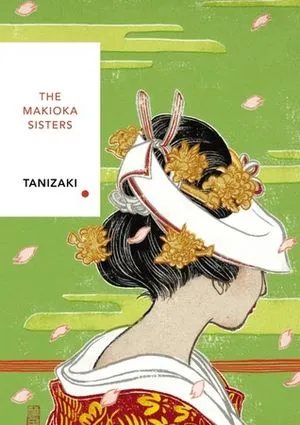
The Makioka Sisters by Jun’ichiro Tanizaki, Translated by Edward G. Seidensticker
In this epic novel reminiscent of social classics such as Middlemarch, Tanizaki writes of four sisters in the years leading up to World War II — the two oldest married, the two youngest still trying to find the right matches. It’s a novel about a family fighting against the tide of modernity, refusing to believe that the world is changing around them. The book was later censored by the military during the war, because the world focuses so deeply on a sheltered, feminine world of luxury. The family’s painful struggle to get the unwed sisters married is the main thread throughout the novel, but everyday life and the modern world is creeping in all around them.
Content warnings for ableism, classism, sexism.
Echo on the Bay by Masatsugo Ono, Translated by Angus Tarvill
The protagonist’s father recently became the policeman of a small seaside town with a heavy weight of rivalries and a history of trauma. She listens in as the residents, from the drunken Mitsugu Azamui to the Silica Four, tell the stories of the village, from sordid, painful rumors to love affairs that were open secrets. She spends nights with her social studies teacher, parked overlooking the beach. Why does Mr. Kawano always show up to take Mitsugu home when he’s too drunk? Why is Toshi the only kid who doesn’t set off rockets at Toshiko-bā’s house? Slowly, she’s able to put together what happened between the two brothers-in-law who are in a constant struggle for control of the town, to solve the lingering mysteries rooted in the town’s shadows.
Content warnings for alcoholism, ableism, suicide, animal death, sexual assault, age gap, pedophilia, domestic violence, prejudice.
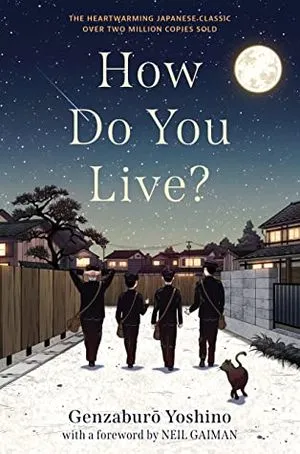
How Do You Live? by Genzaburo Yoshino, Translated by Bruno Navasky
For the first time, Hayao Miyazaki’s childhood favorite is available in English translation. Introduced by Neil Gaiman, this book about Copper’s coming of age amidst his uncle’s sage advice and the tightening of his friend group is a precious, philosophical story set in 1930s Japan about growing up and learning what it is to be a responsible, moral human being. Miyazaki has announced that he will come out of retirement in order to make a final film with Studio Ghibli drawn from this novel that he loved so much when he was young — he sees it as a gift to his young grandson. Reportedly, it will be animated by hand.
Content warnings for classism, bullying.
The Memory Police by Yoko Ogawa, Translated by Stephen Snyder and Markus Juslin
This poignant and fascinating science fiction novel by Yōko Ogawa about loss and memory features a protagonist living on a dystopian island where disappearances are common — everything from birds to fruit to roses can be erased, the vanishings enforced by a dark government agency. the protagonist makes the difficult choice to hide her editor, who says they can remember everything that’s been lost. Ogawa’s writing is surreal, murky, haunting, and visual, and leaves the reader with a lot of questions to consider, but is an incredibly fast read that’s impossible to put down. This one was the one exception I couldn’t help making. While it’s gotten a lot of attention, I still can’t help feeling that it’s massively underrated.
Content warnings for sexual assault, abusive relationship, police brutality, kidnapping and captivity.

The Emissary by Yoko Tawada, Translated by Margaret Mitsutani
After an unnamed but worldwide disaster, Japan shifts into full isolation from the outside world. Animals are going extinct at faster rates; language is policed; plants grow wild. The elderly have had death ‘taken away’ from them, and are possibly immortal, while the young are weak and struggle to survive through their childhoods. Yoshiro cares for his great-grandson Mumei, a frail but happy child. It’s an ambiguous story, and anyone looking for full-fledged exposition will be disappointed. Instead, this is an unsettling snapshot of life within this dystopia, highlighting Yoshiro’s many fears amidst the uncertainty of Mumei’s health and the ever-changing, uncertain world where no one is ever quite sure of the rules.
Content warnings for mentions of rape and suicide, and depictions of gambling addiction, political censorship, death in childbirth.
Breasts and Eggs by Mieko Kawakami, Translated by Sam Bett and David Boyd
This book! I’m obsessed with this work by Kawakami about modern womanhood and motherhood. At its beginning, writer Natsuko watches her sister and niece engaged in a fierce emotional battle; in its second part, Natsuko considers becoming a mother. She’s possibly asexual, but single women cannot adopt or use fertilization methods to become pregnant in Japan — all of which is stark and strange given that Natsuko’s life is saturated by strong single mothers. The novel spins around issues of bodily autonomy, what it means to be a parent and raise a child, sisterhood and female friendship, and more, and is truly worthwhile from start to finish.
Content warnings for mentions and/or discussion of domestic abuse, sexual assault, child abuse, pedophilia, suicide, cancer, and substance abuse, as well as for transphobia (misgendering) and depiction of sexual harassment.
Want more books in translation content? I have lists for you of books in translation from Catalonia, Argentina, France, Mexico, and Central Africa. If you have recommendations or requests for future lists of books in translation, or if you want me to know about a book I might have missed, let me know on Twitter.











